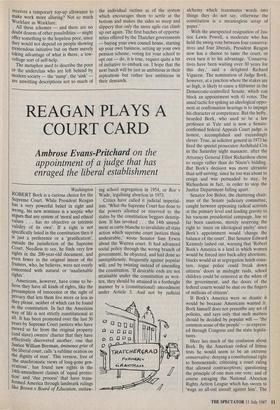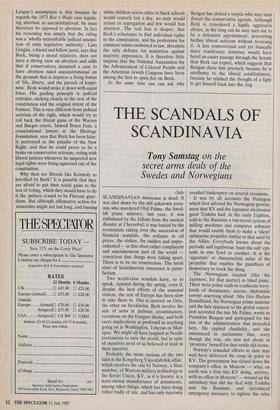REAGAN PLAYS A COURT CARD
Ambrose Evans-Pritchard on the appointment of a judge that has enraged the liberal establishment
Washington ROBERT Bork is a curious choice for the Supreme Court. While President Reagan has a very powerful belief in right and wrong, his new nominee is a sceptic who argues that any system of 'moral and ethical values . . . has no objective or intrinsic validity of its own'. If a right is not specifically listed in the constitution then it is just a preference or a 'gratification', outside the jurisdiction of the Supreme Court. Needless to say, he finds very few rights in the 200-year-old document, and even fewer in the original intent of the framers, who, he believes, were not overly concerned with natural or !unalienable rights'.
Americans, however, have come to be- lieve they have all kinds of rights, like the Presumption of innocence or the right of privacy that lets them live more or less as they please, neither of which can be found in the constitution. In fact the American way of life is not strictly constitutional at all. It has been promoted over the last 30 Years by Supreme Court justices who have moved so far from the original property (and slave) owners' charter that they have effectively discovered another, one that Justice William Brennan, eminence grise of the liberal court, calls 'a sublime oration on the dignity of man'. This version, free of the anachronistic views of long-gone gen- erations', has found new rights in the 14th-amendment clauses of 'equal protec- tion' and 'due process' that have trans- formed America through landmark rulings like Brown v Board of Education, outlaw- ing school segregation in 1954, or Roe v Wade, legalising abortion in 1973.
Critics have called it judicial imperial- ism. 'What the Supreme Court has done to the powers allotted or reserved to the states by the constitution beggars descrip- tion. It has invoked . . the 14th amend- ment as carte-blanche to invalidate all state action which supreme court justices think undesirable,' wrote Senator Sam Erwin about the Warren court. It had advanced social policy through the wrong branch of government, he objected, and had done so surreptitiously, frequently against popular will, and by twisting instead of amending the constitution. 'If desirable ends are not attainable under the constitution as writ- ten, they should be attained in a forthright manner by a (constitutional) amendment under Article 5. And not by judicial alchemy which transmutes words into things they do not say, otherwise the constitution is a meaningless scrap of paper.'
With the unexpected resignation of Jus- tice Lewis Powell, a moderate who has held the swing vote between four conserva- tives and four liberals, President Reagan now has a chance to tame the court, or even turn it to his advantage. 'Conserva- tives have been waiting over 30 years for this day,' said a delighted Richard Viguerie. The nomination of Judge Bork, however, at a junction where the stakes are so high, is likely to cause a filibuster in the Democratic-controlled Senate, which can block an appointment with 41 votes. The usual tactic for spiking an ideological oppo- nent at confirmation hearings is to impugn his character or competence. But the hefty, bearded Bork, who used to be a law professor at Yale and is now a Senate- confirmed federal Appeals Court judge, is honest, accomplished and exceedingly clever. True, as solicitor general in 1973 he fired the special prosecutor Archibald Cox in the Saturday night massacre, after the Attorney General Elliot Richardson chose to resign rather than do Nixon's bidding. But Bork's decision was more altruistic than self-serving, since he too was about to resign and was persuaded to stay, by Richardson in fact, in order to stop the Justice Department falling apart.
Senator Joe Biden, the chattering chair- man of the Senate judiciary committee, caught between appeasing radical activists at the primary level and lending gravity to his vacuous presidential campaign, has so far been cautious, merely reserving the right to 'insist on ideological purity' since Bork's appointment would 'change the balance of the court'. But Senator Edward Kennedy lashed out, warning that 'Robert Bork's America is a land in which women would be forced into back-alley abortions, blacks would sit at segregation lunch coun- ters, rogue police could break down citizens' doors in midnight raids, school children could be censored at the whim of the government, and the doors of the federal courts would be shut on the fingers of millions of citizens'.
If Bork's America were so drastic it would be because Americans wanted it. Bork himself does not prescribe any set of policies, and says only that such matters should be decided by popular will — 'the common sense of the people' — as express- ed through Congress and the state legisla- tures. Here lies much of the confusion about Bork. By the American ordeal of litmus tests he would seem to be an extreme conservative: denying a constitutional right to homosexuals; criticising a court ruling that allowed contraceptives; questioning the principle of one man one vote; and of course enraging the National Abortion Rights Action League which has sworn to 'wage an all-out assault against him'. The
League's assumption is that because he regards the 1973 Roe v Wade case legalis- ing abortion as unconstitutional, he must therefore be opposed to abortion. In fact his reasoning was simply that the ruling was a 'wholly unjustifiable judicial usurpa- tion of state legislative authority'. Lino Graglia, a friend and fellow Jurist, says that Bork, being a moral relativist, does not have a strong view on abortion and adds that if conservatives mounted a case to have abortion ruled unconstitutional on the grounds that it deprives a living foetus of 'life, liberty, and the pursuit of happi- ness', Bork would strike it down with equal force. His guiding principle is judicial restraint, sticking closely to the text of the constitution and the original intent of the framers. This is very different from judicial activism of the right, which would try to roll back the liberal gains of the Warren and Burger courts. Indeed Bruce Fein, a constitutional lawyer at the Heritage Foundation, says that Bork has been false- ly portrayed as the paladin of the New Right, and that he could prove to be a brake on conservative activism, voting with liberal justices whenever he suspected new legal rights were being squeezed out of the constitution.
Why then are liberals like Kennedy so horrified by Bork? It is possible that they are afraid to put their social gains to the test of voting, which they would have to do if the justices ceased to be Platonic guar- dians. But although affirmative action for minorities might not last long, and bussing white children across cities to black schools would scarcely last a day, no state would return to segregation and few would ban abortion. The real fear is deeper, that Bork's reluctance to find individual rights in the constitution, and his preference for common values enshrined in law, threatens the only defence for minorities against majority oppression. It is therefore little surprise that the National Association for the Advancement of Colored People and the American Jewish Congress have been among the first to open fire on Bork.
At the same time one can ask why Reagan has picked a sceptic who may later thwart the conservative agenda. Although Bork is considered a highly aggressive choice, in the long run he may turn out to be a defensive appointment, preventing further liberal activism without reversing it. A less controversial and yet basically more reactionary nominee would have faced an easier passage through the Senate than Bork can expect, which suggests that Reagan chose him precisely because he is anathema to the liberal establishment, because he relished the thought of a fight to get himself back into the ring.



















































 Previous page
Previous page